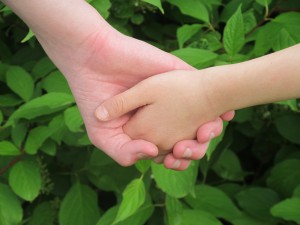Editor’s note: Welcome to APtly Said’s celebration of mothers! This year’s theme for Mother’s Day is “Life Lessons” as Attachment Parenting International celebrates with an inspiring series from May 7-11. We hope you enjoyed your Mother’s Day and were able to reflect on what you’ve learned through your motherhood journey.
 When my first son transitioned into toddlerhood, I discovered that I had a lot more to learn about raising children than I realized! The most compelling question I asked myself was how to preserve our warm and loving relationship when I also had to say, “No, you can’t have that,” or “No, you can’t do that.”
When my first son transitioned into toddlerhood, I discovered that I had a lot more to learn about raising children than I realized! The most compelling question I asked myself was how to preserve our warm and loving relationship when I also had to say, “No, you can’t have that,” or “No, you can’t do that.”
I still remember the day he was able to pull out the books from the lower shelf of a bookcase in our living room, crumpling and ripping the pages with his sweet, pudgy little hands. How could I stop him without hurting or alarming him? I thought about how challenging it was going to be to guide him without provoking his defenses against me.
The more he grew and became independent, the more insight I needed to navigate the daily incidents that cropped up and compelled me to steer him in the right direction. “We have to put the toys away before taking out more,” “Bedtime is now,” and “Homework comes before television,” were only some of the daily situations that I had to take charge of.
When our children are not inclined to follow our instructions, they push our buttons and we lose our patience. For the first time, it occurred to me that parents might be pressing their children’s buttons when we don’t understand what makes them react to us the way they do.
I have 6 children. As the years went by and I became more seasoned in my parenting, I saw how easily their buttons could be pushed — how easily they could become alarmed, frustrated, and insecure.
It was easy to get the right behavior out of children by scaring them, threatening them, warning them, or taking away things from them that they cared about. “I’m counting to 3, then I’m leaving without you!” has always brought forth the right behavior in young children, but at a very high price. When you push your child’s alarm button too often or too many times, the very system that alerts him to beware of a risky situation begins to work in a distorted way and new problems start showing up.
This is an even more startling revelation when it comes to adolescents, because this same alarm system in the brain continues to harden the defenses even more when their buttons are continually pushed. They become tear-less and fearless, as they lose their caring and other vulnerable feelings altogether. This is on a continuum and can potentially lead to addictions and other problem behaviors like cutting.
 When my children grew past the years of breastfeeding and needing to be attached to me through physical closeness, I learned that I was only at the beginning of the attachment story. The work of attachment was my responsibility, so they could rest in the relationship and be free to discover their own selves.
When my children grew past the years of breastfeeding and needing to be attached to me through physical closeness, I learned that I was only at the beginning of the attachment story. The work of attachment was my responsibility, so they could rest in the relationship and be free to discover their own selves.
It was not a given that the relationship would be preserved simply because it got off to a good start. The relationship was still fresh and tender, and still needed to be cultivated, secured and deepened throughout all the years ahead of us. This was to be the shield from hurtful people and environments outside of our relationship. A deeper attachment was the answer to ensuring a healthy alarm system and preserving my children’s ability to experience all of their vulnerable feelings, so they could develop meaningful and deep relationships as well as develop their individuality and the traits that characterize maturity.
I needed to keep my relationship with my children clean from wounding. Their buttons might have been pushed by their friends or even by their teachers, but I needed to be aware of not being the one to provoke their defenses. I wanted to be that safe place — a home base or haven — where they could feel rest and comfort, no matter at what age. This challenged me to find ways to stand by my rules and limitations, preserve order, and transmit values in a way that protected our relationship.
This was my greatest learning experience, so that I could do the most important work than any parent does — help my children grow up to be mature, responsible, caring, and considerate adults.

Would love more info on this topic.
And so the things you actually did were….?
Would love more information on the choices you made. Suggestions..